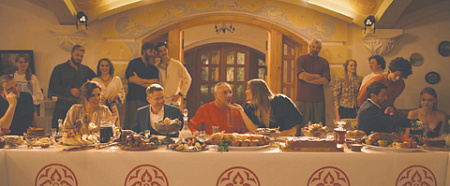
A new trend is gaining popularity among Russia’s urban youth: a rural escape dubbed “izbing” or “derevening.” The concept involves young city dwellers leaving the bustle of the metropolis for the tranquility of the countryside, seeking a connection with nature untouched by civilization. The internet is flooded with listings for village houses, with prices ranging from modest to exorbitant. Yet, many of these destinations are purpose-built simulacra of village life, offering rustic-chic cabins with all the modern amenities of a hotel, a far cry from the authentic experience they claim to provide.
This yearning for the rural is not new. It echoes a long-standing tradition from the Soviet era, when urban intellectuals would often spend their summers in villages, staying with relatives in what was seen as a romantic return to the nation’s roots. This cultural trope, immortalized in films and literature, painted a picture of simple, profound country life. But the gap between this idealized image and the stark reality of the Russian hinterland can be profound, a lesson I learned firsthand.
In the late 1990s, long before “izbing” became a trendy hashtag, I embarked on my own retreat. Driven by a desire to escape Moscow’s relentless pace, I accepted an offer to spend a month in a remote village in the Tver region. My romantic notions, however, shattered within days. The picturesque log cabin of my imagination was, in reality, a dilapidated grey shack in a dying hamlet. The village was a ghost of its former self, with only a handful of elderly residents remaining among the skeletons of burnt-out and abandoned homes. This was a stark portrait of Russia’s rural decline.
My days became a constant struggle against an unfamiliar and unforgiving reality. The centerpiece of the home was a massive traditional stove, or ‘pech,’ which I, a city native, had only ever seen in cartoons. My attempts to use it for cooking were clumsy and nearly disastrous. Basic amenities were non-existent. Water had to be hauled from a communal well, the toilet was a bucket in the entryway, and for the first few days, before the electricity was fixed by a local, my only light came from candles.
The challenges were not just physical but psychological. The absolute, deafening silence that fell after 8 p.m. was unnerving for someone accustomed to the city’s perpetual hum. With no phone signal, television, or radio, and my one book quickly finished, boredom gave way to a creeping anxiety. Fear became a constant companion, stoked by locals’ warnings of wolf tracks in the area and the impenetrable darkness of the unlit village. Even the nature I had craved felt hostile, from the swarms of large mosquitoes to the aggressively territorial free-roaming livestock.
My escape was ultimately precipitated by a broken-down car and a terrifying encounter. After waiting nearly a week for a local mechanic to emerge from a drinking binge to fix my vehicle, I found a viper sunning itself on my doorstep. That was the final straw. Panic-stricken, I was ready to walk back to civilization. Fortunately, the car was finally repaired, and within half an hour, I was gone, driving faster than I ever had before, fleeing the rustic reality I had so naively sought.
Today’s commercialized “izbing” offers a sanitized, comfortable version of this life, carefully stripped of its harshness. But my experience reveals a deeper truth about the vast, often painful, disconnect between Russia’s thriving megacities and its fading, forgotten heartland. It serves as a reminder that behind the curated Instagram posts of rustic bliss lies a complex and often bleak reality of depopulation and decay that continues to shape the nation.
